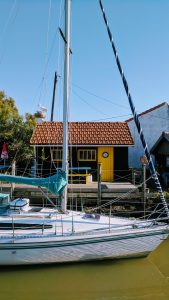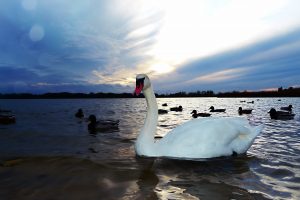A NEW POSITION IN THE RELATIONAL FIELD
Our disconnected human-centric point of view shapes our world. For a paradigm shift, we need to free ourselves to come from a different premise, to make different choices. We need new kinds of stories to show us a wider view, aligning with the harmony that is the underlying principle of our own being, and of life itself.
Instead of considering our world as a collection of objects, let’s picture ourselves in a relational field. The relational field is a landscape—metaphysical or real—where the position of the point of view determines relationships to other elements, and to the larger context.
Here’s an illustration:
Imagine you are onboard your yacht at its mooring by the dock, enjoying a picturesque view of the bay—you are anchored in what is considered to be the best spot. A walkway leads directly to shore, where everything you need is within immediate reach at the dock. A wheelbarrow is available for easy transport of your purchases back onboard.
 Though you don’t pay much attention to them, there are other moorings around yours—all less desirable, in varying degrees, depending on how far they are from dock or shore, that being the most important factor.
Though you don’t pay much attention to them, there are other moorings around yours—all less desirable, in varying degrees, depending on how far they are from dock or shore, that being the most important factor.
Imagine one day you sail into the bay to find someone else’s yacht is anchored at the prime mooring, obliging you to take another. It’s still in the same bay, with the same collection of boats, but the world looks entirely different from here. No longer do you have the walkway connecting you to shore, or direct access to the gas pump, to fresh water, and harbor stores. Instead, the little dinghy attached to your stern has to be uncoupled and become the new vehicle for transfer. You have to take the oars and row. Each time you make the crossing, no matter where you aim the prow, the tide and currents in relation to your strength will determine exactly where you land on the muddy beach.
Shopping at harbor stores is no longer an option, since you don’t have access to the walkway. But from your new mooring you notice there’s a farmhouse, previously blocked from view, within easy walking distance from where you come to land. Since you can buy fresh milk, eggs, and produce here, you will change your menu plan to accommodate the available ingredients. On your way back to the beach from the farmhouse, you realize that this view shows how your boat is actually better protected at the new mooring.
Aboard your yacht again, you notice the family of swans that comes close—they were never seen near the ramp. Gulls and ducks are also part of the landscape, unnoticed before. You realize that proximity to shore was only one value. You could instead rate mooring desirability according to other criteria that have bearing now, such as safety in a storm, or access to fresh food, or privacy (in which case, you’d moor in an altogether different, apparently deserted, spot.)

A shift the point of view from your new mooring changes the appearance of the terrain and impacts relationality. It’s analogous to what needs to happen to our worldview. Our current challenge is to re-orient towards the larger community of life, to find the place where we belong, where we have the fullest, most vital expression, one that contributes to, rather than destroys, the vitality of the whole.
© Chez Liley All Rights Reserved